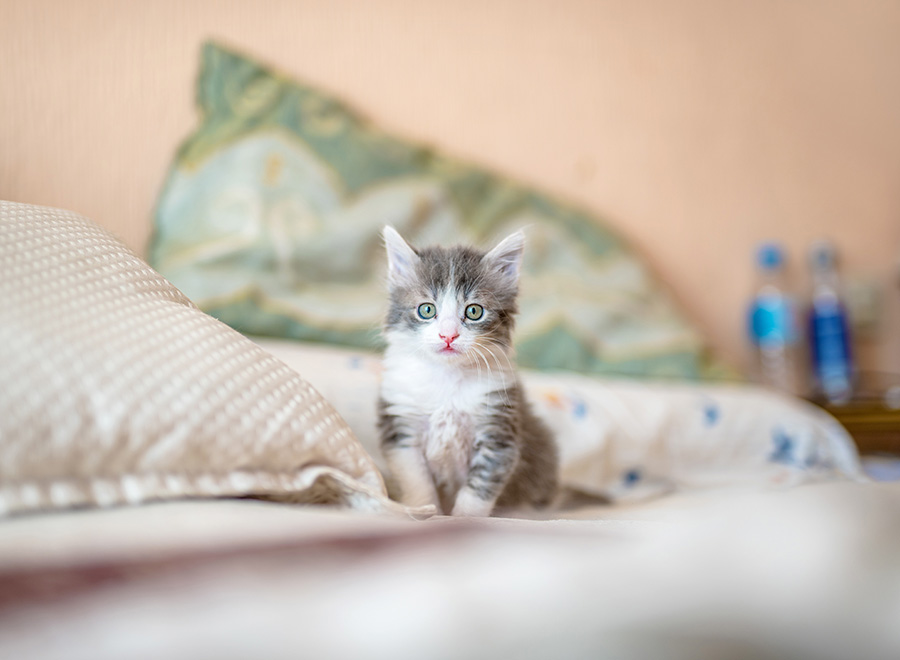Vaccinations and Worming
4 Weeks
Start worming fortnightly with Milbemax tablets for kittens or Felex Paste. Always worm according to weight; as your kitten is growing quickly we advise weighing him/her before each worming.
6-8 Weeks
Kittens have their first vaccination (F3). If you have purchased your cat from a breeder or a pet shop he/she may have already had this vaccination.
10-12 Weeks
Worming can now be done every month, remember to weigh your kitten first.
This is when your kitten/s have their 2nd vaccination.
14-16 Weeks
This is when your kitten/s have their 3rd vaccination.
We often see kittens at 10-12 weeks of age who have not been vaccinated; in this case they need two vaccinations one month apart, i.e. one at 10-12 weeks and the second at 14-16 weeks.
Vaccination types
Cats are routinely vaccinated against Feline Enteritis and Cat Flu.
The feline AIDS vaccine is a new vaccine & is recommended in cats that will be going outdoors. Feline AIDS is transmitted mainly during cat fights (saliva to blood transmission). The large numbers of cats in the Inner West, both stray & domestic, make cat fights difficult to avoid. The Feline AIDS vaccine does not offer total protection against AIDS but given the seriousness if the disease it is worth giving. Discuss this new vaccine with the vet during your consultation. You cannot catch human AIDS or HIV from a cat.
The Feline Leukaemia vaccination is also available. The Leukaemia virus is transmitted via saliva (when cats groom each other or in a fight). Contracting the Leukaemia virus is always fatal. It can cause cancer (especially Siamese cats), but the virus is not common in Sydney. The vaccination is safe and will provide immunity against the disease.
Microchipping
As of the 1st of July 1999 all new cats and kittens must be microchipped and registered with the NSW Companion Animal Register. By law should do this done at the point of sale or transfer irrespective of the cat/kittens age. Desexed animals are cheaper to register with the council.
Desexing
The best age to desex your cat is 5-6months. Most females do not come into heat prior to this and most males do not begin to spray or become territorial before this age. Please call to make a surgery appointment.
Feeding
Both tinned & dry commercial preparations are fully balanced diets for kittens and cats. Stay away from the cheaper “No Name” brands as they may lack the essential nutrients. Never feed your cat or kitten only fresh meat, kittens especially grow very quickly and need a lot of calcium and vitamins. Fresh meat does not contain all the essential calcium and vitamins your cat or kitten requires. Giving your kitten cat milk cannot make up for the lack of calcium in fresh meat. Lack of calcium in their diet will lead to poor growth, and are more likely to fracture their soft bones.
In addition to tinned and or a dry food diet it is important to introduce chicken necks or wings to help keep their teeth clean. Chicken necks or wings should be given 2-3 times a week. if your kitten will not eat these or it is not practical the nurses can recommend a commercial dry food for teeth care.
Litter
Always provide fresh litter for your kitten. It is a good idea to use the same litter as the pet shop/breeder used as they will be familiar with this and less likely to go in inappropriate places.
Environmental Enrichment
Kittens should not be allowed outside unattended until at least 6 months of age. It is important to make inside fun for the kitten, with plenty of cat toys, scratching posts etc. Some cats can be taught to sit, stay & fetch with patience. Lots of TLC at this age helps your kitten develop into a contented, relaxed and confident adult.
If you have any questions about your kitten we are always happy to help.






